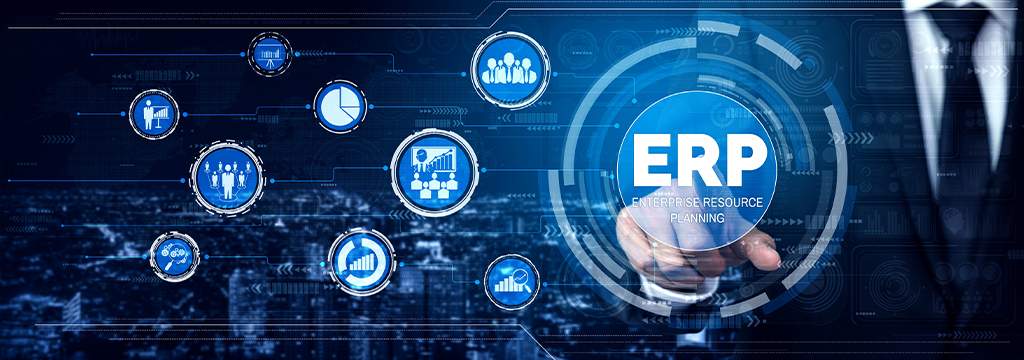Enterprise Resource Planning (ERP) is a process that helps companies manage resources effectively and efficiently. It includes employee scheduling, inventory management, and financial reporting. ERP is used across industries, including manufacturing, healthcare, and retail.
In this blog post, we will discuss ERP and how it can be applied in various industries.
Let’s get started.
What is Enterprise Resource Planning (ERP) software?
An ERP is a software that helps businesses manage various aspects of their operations, including inventory, accounting, and human resources. It integrates all these different facets into one system to streamline processes and make information readily available to authorized users.
ERP systems typically consist of modules, each covering a specific area of business functionality. The most common modules include:
- Financials
- Sales and marketing
- Customer relationship management (CRM)
- Human resources (HR) and payroll
- Manufacturing
- Supply chain management (SCM)
Depending on the organization’s size and needs, an ERP can be deployed either on-premises or in the cloud. On-premises ERP systems are installed and run on the company’s servers, while cloud-based solutions are offered as a service, with the provider responsible for hosting and maintaining the software.
ERP systems can be complex and expensive to implement, so it’s important to consider whether one is right for your business or not. ERP is best suited for larger organizations that have outgrown their existing systems and need a more comprehensive solution to manage their growing operations.
ERP Applications in Various Industries
- ERP for healthcare
The healthcare industry is one of the most complex and heavily regulated industries globally. Healthcare ERP systems must comply with regulations set forth by governing bodies such as the Centers for Medicare and Medicaid Services (CMS) and the Joint Commission. In addition, they must be able to integrate with a variety of third-party applications used by healthcare organizations, such as electronic medical records (EMR) systems.
- ERP for manufacturing
Enterprise resource planning software is commonly used in the manufacturing industry. Large manufacturers use ERP to manage inventory, track production costs, and fulfill customer orders. Often, ERP systems are integrated with other software applications, such as manufacturing execution systems (MES) and product lifecycle management (PLM) tools.
ERP can help manufacturers streamline their operations, improve visibility into their business, and make better decisions about where to allocate resources. For example, an ERP system can be used to track raw materials and finished goods inventory levels, schedule production tasks, and monitor machine utilization rates.
- ERP for education
One of the main problems faced by the education sector is the increasing cost of running educational institutions and managing student data. Enterprise Resource Planning (ERP) systems can be very beneficial for the education industry as they provide a centralized database for all information related to students, staff, finances, and resources. ERP systems can help educational institutions improve their financial management, increase operational efficiency, and better utilize their resources.
- ERP for retail
In the retail sector, enterprise resource planning can be used to manage inventory, track customer orders and payments, and schedule staff shifts. By integrating all of these functions into one system, retailers can gain greater visibility into their operations and make more informed decisions about running their businesses.
ERP can also help retailers better understand their customers’ needs and preferences. Retailers can identify trends and develop targeted marketing campaigns by tracking customer data.
- ERP for construction
The construction industry is one of the most complex and challenging industries. ERP systems for construction typically include project management, accounting, purchasing, and inventory control modules. Project management features in an ERP system can help managers plan construction schedules, track progress on tasks, and allocate resources.
- ERP for the automotive industry
The automotive industry is one of the most important manufacturing industries worldwide. To meet the needs of modern consumers, who demand ever-higher levels of quality and customization, manufacturers must be able to produce vehicles quickly and efficiently. This requires a highly complex supply chain to manage effectively to avoid costly delays and disruptions.
The Bottom Line
ERP systems are beneficial for organizations because they provide an integrated view of their core business processes. They can also improve efficiency and decision-making while reducing costs. However, ERP implementations can be complex and costly and require significant organizational change.
Thus, it is important to carefully consider whether an ERP system is right for your organization before deciding.


